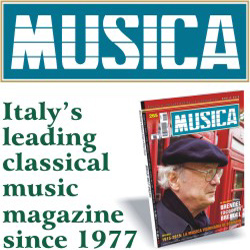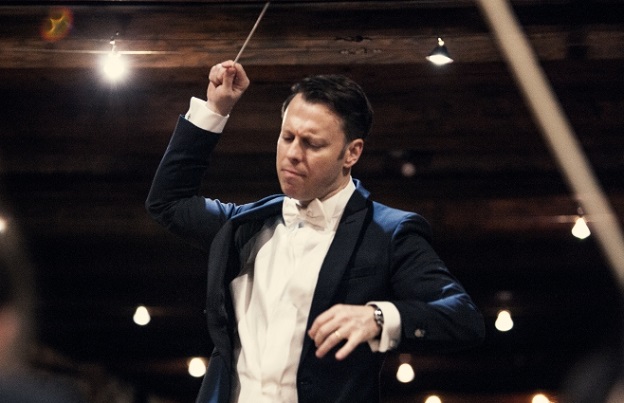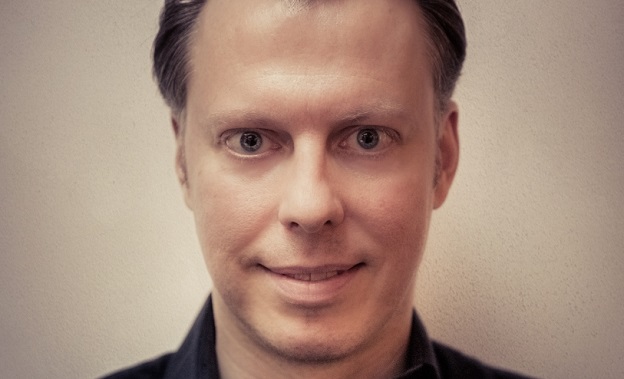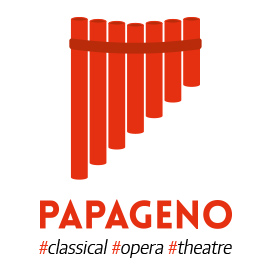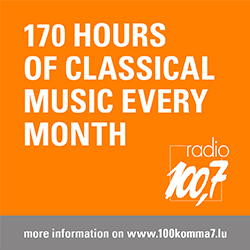David Philip Hefti was awarded the Composer Award 2023 of the International Classical Music Awards (ICMA), and in the summer he was Composer in Residence of the Zermatt Festival. Jury member Andrea Meuli (Musik + Theater) spoke with the composer.
David Philip Hefti’s tonal language fascinates with a wide spectrum of expressive means. Luminous timbres and dramatic condensations are as much a part of it as subtle and fragile sound developments. The Swiss composer also develops a broad spectrum of genres, from opera to large orchestral works and chamber music. At the end of May, his ballet music « Ans Ende der Zeit » was premiered at the Graz Opera; and this summer, at the Zermatt Festival, the world premiere of an octet is scheduled, written for the Scharoun Ensemble Berlin. We met David Philip Hefti for an interview on the occasion of this year’s ICMA Award Gala in Wroclaw, Poland, formerly Wroclaw.
David Philip Hefti, how lonely is a composer?
A composer is very lonely most of his life, because he spends it in his « ivory tower ». That’s why I always enjoy it so much, as soon as a piece is finished, to approach the performers, to rehearse together if necessary, and of course to experience the performance. The whole social thing around a concert is also important to me and is just as much a part of my work: going out to eat and drink together. As an individual, I need this balance; without it, one would quickly become lonely. For me, however, there is no danger of this because I work at home and my family gives me a good support. That always brings me back down to earth. But basically, composing is indeed a decidedly lonely profession.
What made you decide to venture into a composer’s life?
That’s a good question. Actually, everything developed quite organically for me. Even as a teenager, before I graduated from high school, I was a young student at the Musikhochschule in Winterthur. I always studied an instrument – in my case the clarinet – as well as conducting and composing at the same time. My parents always supported this path, it was only important to them that I completed my schooling. Without this support at home, I would never have gotten to where I am today. Even with my clarinet trio, we played many concerts in Switzerland – and it was incredibly fun. I was hooked on music early on and couldn’t help but take this path. It was a very easy decision, right up to composing.
Composing always means implementing one’s own ideas, noting down ideas. The actual sonic realization is a next step. How far removed from your original intention do you always experience the premieres of your works?
That’s easy to answer. Today, a world premiere is extremely close to the sounds I had in mind. However, if we go back thirty years, this sometimes did not correspond at all. That was not the fault of the interpreters, but my personal inability, since I was lucky enough to always be able to count on incredibly good musicians. Of course, I had learned everything in my composition studies about how to build up and notate sounds. But the fact that they are then played by the performers the way I had them in my head is based solely on experience. That has nothing to do with knowledge from university days. In the course of the thirty years that I have been in this profession, it has become more and more similar. Of course, sometimes there are still a few surprises, but I write everything down with the awareness and knowledge that the performers have to translate the musical notation back. There is a certain meticulousness behind it.
Have you also experienced that performances by different interpreters have broadened or changed your perception of your own work?
Yes, that does happen. When I conduct myself, I always have the feeling that I have everything under control. That’s why I’m relatively relaxed when I give my own premiere in front of an orchestra; I’m much more nervous when I’m sitting in the audience and someone else is conducting. Not that I distrust a performer – the musical level is so high today, but tension always results from the constellation that I lose all control over my piece.
How is it in chamber music?
In my string quartets, I have put a rather tight corset on the performers by means of a very precisely notated score. These pieces are played often and actually change over time. This takes place both in my head, but also through the performers themselves, who always play the piece a little differently, even if they keep exactly to the score. That’s what’s interesting to me: new music is just as alive as works from older eras. Especially through interpreters who play the same piece over and over again. In this way a work becomes more mature, it breathes more and becomes freer. And that interests me!
Does repeated listening under different conditions also trigger new creative processes in you as a composer?
Yes, definitely, again and again. It is the greatest inspiration for me to work with these people and artists. Every piece and every rehearsal triggers a sound or an idea again.
Does the audience play a role in composing, is it taken into consideration?
Of course, one always thinks of an audience when composing; however, I am far from aiming at any taste of the audience. That would be dishonest to myself. Anyway, I can only compose what I have in my head or feel in my body. The sounds that you put down on paper and which then resound in a hall can only be those that you carry within you.
Is there a difference in craft in the composition process between chamber music structures and large orchestral works?
The main difference lies in the effort involved. Composing for orchestra is more elaborate because there are simply more instrumental parts to notate. When it comes to the artistic, the effort remains similar, because you develop ideas and structures that can be comparable for a string quartet or large orchestra. Interestingly, it is much easier for me to compose for the large orchestra, because everything is possible, as it were: every idea can be realized in very different ways, and a very wide range of instruments is available for everything. However, if I only have a flute and a bassoon at my disposal for the realization of a certain idea, it becomes very demanding. But that is exactly what I need as a challenge! That’s why I also love writing chamber music works. Perhaps it takes more craft, more tricks, to realize compositional ideas the way you imagine them as a composer.
Do ideas from performers also flow into your compositional process?
No, but that has to do with the way I work. Before I compose the first note, my ideas are all already recorded in the sketchbook. Then I withdraw into my closet and write the score all by myself, without any discourse with the performer – even though I always have him present, see him, as it were, in my inner eye. This also means a form of inspiration for me. Especially since I always try to get to know my interpreters very well beforehand.
There is something like a hardcore scene in contemporary music with the famous ivory tower almost as a distinction. Does the so-called avant-garde isolate itself too much?
Everything that presents itself dogmatically is hermetically sealed off. I am very happy that I live in the now, in a time in which there is hardly any rule of dogmas. At least that’s how I feel as a composer of a middle generation. These dogmas simply no longer interest me. I also hear this from my colleagues who experience it similarly. Perhaps there are still a few places or schools that try to hold on to dogmatic guidelines. But it seems to me that the opposite is becoming the danger. I have the impression that we are moving towards anything goes. I imagine that it is very difficult for a young composer to search for and find his own sound language.
Do you have any concerns about arbitrariness?
Arbitrariness is a good keyword. It is anathema to me – and should be anathema to everyone. In this respect, it’s not bad at all if you’re given something to do at a young age. You can then initially take this path and later decide whether it is good or bad for you, suitable or rather not. On the other hand, I naturally have my problems with strict dogmatics that follow you for your whole life. It is also interesting how radically some composers have changed from radical dogmatists to « soft-spoken » composers.
You often appear as a conductor as well. For the pleasure of it or as a safeguard against the extinguishing of creative fire, against the running out of compositional ideas?
I love conducting, and I also need it as a balance to composing in the lonely room. Conducting offers me the opportunity to be among people as a musician. At the same time, the practice of actively making music is also important to me. Of course, one can argue whether a conductor is actively making music – I think so. In any case, it would be terrible for me to lose touch with practice, to just sit at a desk and wither away as a theoretician. That danger would exist. That’s why I’m looking for the perfect balance between both areas, and I don’t conduct too often, no more than eight weeks a year.
As a composer, what appeals to you more: chamber music or rather the intoxicating sound possibilities of the orchestra?
As a composer, I have always tried to have a good balance between chamber music and orchestral music. It is much more strenuous and means far more work to write an orchestral score. But artistically, the development of thoughts, the dramaturgy of a work is then very comparable and for me hardly differs between orchestral and chamber music. I love and probably need these differences in instrumentation. I do love the exhilaration and the very large orchestra, even if climaxes in quadruple fortissimo rarely occur in my works (laughs). Much more important to me are the diverse possibilities, the broad palette of sounds that the orchestra offers me – quietly developing sounds are my favorite! There we are again close to chamber music, which requires a much finer brush when composing. That’s why I couldn’t decide on one genre – I need both.
Talking about genres: So far, opera has challenged you twice. Are there any further plans?
There are ideas…
… again to strong female characters, as in your previous opera projects, « Anna’s Mask » and « The Snow Queen »?
That’s interesting that you bring that up. I’ve never thought about it before, but it’s like scales falling from my eyes now. That’s right. There are no concrete plans yet, but there is a strong idea and the will to create a third opera. It will be about the diaries of a horrible historical figure. I can’t say any more about it yet, but I am in contact with the director of my second opera and dramaturges. However, we don’t know yet whether the project can be realized.
What are you currently writing? Are there any current plans for a next world premiere?
I was commissioned by the Zermatt Music Festival, of which I had the privilege of being composer-in-residence this year, to compose a new work for the Scharoun Ensemble of the Berlin Philharmonic. Ever since my student days, when I often performed Schubert’s Octet as a clarinetist, there has been a desire to compose for this instrumentation. The fact that I was now able to write a work in this instrumentation for one of the best ensembles in the world is simply fantastic! I am therefore very pleased that my new octet, after its premiere in Zermatt, will also receive its German premiere in the anniversary concert celebrating the 40th anniversary of the Scharoun Ensemble at the end of September in the Berlin Philharmonie.
We are sitting here in Wroclaw, where you are receiving the Composer Award of the International Classical Music Awards – what does this award mean to you?
The Composer Award of the ICMA is a very important prize in my eyes, because it is not about recordings sold, nor can you apply for it. The jury is broad and outstanding in the music world, as it is composed of twenty of the most prestigious professional magazines and radio stations. It is therefore a real critics’ prize. That the choice fell on me this year, I can still hardly believe and I am honored. Thanks to the media represented on the jury, the prize also receives enormous international attention, which is a more than pleasant side effect!







